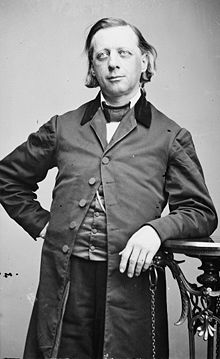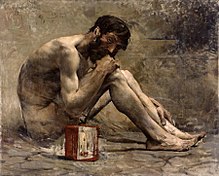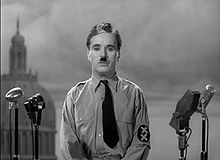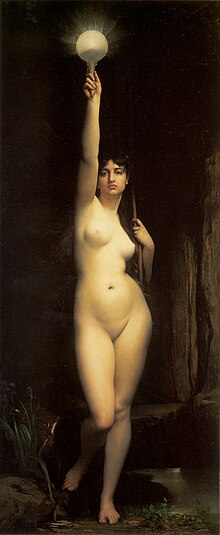Cynicism
Cynicism is a term which originally referred to the ancient Greek philosophy of the Cynics, often considered to have been founded by Antisthenes. Currently, the word "cynicism" generally refers to the opinions of those who are inclined to reject appearances of sincerity, human virtue, or altruism, and maintain that self-interest is the primary motive of human behaviour. The most extreme forms of cynicism can lead to anomie and nihilism.








A
edit- There is nothing so pitiful as a young cynic because he has gone from knowing nothing to believing nothing.
- Maya Angelou, as quoted in The Truth in Words (2005) by Neal Zero
B
edit- Cynic: An idealist whose rose-colored glasses have been removed, snapped in two and stomped into the ground, immediately improving his vision.
- Rick Bayan (b. 1950), U.S. author, copyrighter and cynic. The Cynic’s Dictionary (1994)
- The cynic is one who never sees a good quality in a man and never fails to see a bad one. He is the human owl, vigilant in darkness and blind to light, mousing for vermin, and never seeing noble game. The cynic puts all human actions into two classes — openly bad and secretly bad.
- Henry Ward Beecher, in Lectures to Young Men: On Various Important Subjects (1860) Lecture IV : Portrait Gallery
- Cynic, n. A blackguard whose faulty vision sees things as they are, not as they ought to be.
- Ambrose Bierce, in The Devil's Dictionary (1911)
C
edit- If you scratch a cynic, you will find a disappointed idealist.
- Our knowledge has made us cynical. Our cleverness, hard and unkind. We think too much and feel too little. More than machinery we need humanity. More than cleverness we need kindness and gentleness. Without these qualities, life will be violent and all will be lost.
- Charlie Chaplin, in The Great Dictator (1940)
- Cynicism masquerades as wisdom, but it is the farthest thing from it. Because cynics don’t learn anything. Because cynicism is a self-imposed blindness, a rejection of the world because we are afraid it will hurt us or disappoint us.
- Stephen Colbert, Knox College Commencement Address (3 June 2006)
- Young people who pretend to be wise to the ways of the world are mostly just cynics. Cynicism masquerades as wisdom, but it is the farthest thing from it. Because cynics don't learn anything. Because cynicism is a self-imposed blindness, a rejection of the world because we are afraid it will hurt us or disappoint us. Cynics always say no. But saying "yes"...
- Stephen Colbert, Knox College Commencement Address (3 June 2006)
- Cynicism is full of naive disappointments.
- Mason Cooley (1927-2002), American aphorist. City Aphorisms (1984)
- Cynicism formulates issues clearly, but only to dismiss them.
- Mason Cooley, City Aphorisms, Sixth Selection (1989)
- Cynicism is intellectual treason.
- Norman Cousins, Human Options (1981)
D
edit- Cynics are disappointed romantics; they keep looking for someone to admire and can never find anyone.
- Len Deighton, Stated by the character, Byrd, in An Expensive Place to Die (1967), Ch. 34
E
edit- People who are stupid, unscrupulous, or hypocritical, think that others are just the same. And — this is the real pity — they treat them as if they were.
- Josemaría Escrivá Furrow #551
F
edit- I was too green to know that all cynicism masks a failure to cope – an impotence, in short; and that to despise all effort is the greatest effort of all.
- John Fowles, The Magus (1966)
- Cynicism is cheap – you can buy it at any Monoprix store – it’s built into all poor-quality goods.
- Graham Greene (1904–1991), British novelist. The Comedians (1966), pt. 1, ch. 1, sct. 3
H
edit- A cynic is not merely one who reads bitter lessons from the past; he is one who is prematurely disappointed in the future.
- Sydney J. Harris (b. 1917), American journalist. On the Contrary (1962) Ch. 7
- Cynicism is an unpleasant way of saying the truth.
- Lillian Hellman in The Little Foxes (1939)
- Your universities teach you to be eternal cynics, a cynicism that can be only drowned in alcohol and diet pills and psychoanalysts and golf. Forget your cynicism. There is not one who has more respect for life than a revolutionist.
- Abbie Hoffman, Woodstock Nation (1969)
- Irony differentiates. Cynicism never does.
- Paul Horgan, in Approaches to Writing (1973), No. 398
- Those who are too weak to make a stand against reality have no choice but to obliterate themselves by identifying with it. They are never rationally reconciled to civilization. Instead, they bow to it, secretly accepting the identity of reason and domination, of civilization and the ideal, however much they may shrug their shoulders. Well-informed cynicism is only another mode of conformity. These people willingly embrace or force themselves to accept the rule of the stronger as the eternal norm.
- Max Horkheimer, Eclipse of Reason (1947), p. 113
- There is a principle, supposed to prevail among many, which is utterly incompatible with all virtue or moral sentiment; and as it can proceed from nothing but the most depraved disposition, so in its turn it tends still further to encourage that depravity. This principle is, that all benevolence is mere hypocrisy, friendship a cheat, public spirit a farce, fidelity a snare to procure trust and confidence; and that while all of us, at bottom, pursue only our private interest, we wear these fair disguises, in order to put others off their guard, and expose them the more to our wiles and machinations.
- David Hume, An Enquiry Concerning the Principles of Morals (1751), Appendix 2
- A cynic is what an idealist calls a realist.
- Sir Humphrey Appleby, played by Sir Nigel Hawthorne in Yes, Minister, Series Three (1982), Episode Four: The Moral Dimension, written by Antony Jay and Jonathan Lynn
J
edit- Cynicism isn't smarter, it's only safer. There's nothing fluffy about optimism.
- Jewel Kitcher on The Late Late Show (24 January 1997)
L
edit- You resemble those political economists who, if they see a paragraph in the paper one day rejoicing over the country's prosperity, examine its columns to see what new tax is to be suggested.
- Letitia Elizabeth Landon, Romance and Reality (1831), Vol. I, Chapter 11
- I once said cynically of a politician, "He'll double-cross that bridge when he comes to it."
- Oscar Levant, in The Memoirs of an Amnesiac (1965), p. 13
M
edit- During the Cold War, you could trot out communism or anti-imperialism as alternatives, but today few people will believe your obviously corrupt system is better than the rule of law and democracy championed by the West. So you appeal to cynicism rather than idealism. You say that the so-called democracies of the world are just as craven and corrupt as anyone, but less honest about it; that every country kills its enemies; that all media is propaganda; that morality is just a weapon some countries use to beat up others; that in this contest, there is no objective truth, just subjective opinion, no right or wrong, just winners and losers.
- Tom Malinowski, "What America Stood For" (25 March 2017), The Atlantic
- Cynicism is intellectual dandyism.
- George Meredith, in The Egoist (1879), Ch. 7
- A society that is in its higher circles and on its middle levels widely believed to be a network of smart rackets does not produce men with an inner moral sense; a society that is merely expedient does not produce men of conscience. A society that narrows the meaning of ‘success’ to the big money and in its terms condemns failure as the chief vice, raising money to the plane of absolute value, will produce the sharp operator and the shady deal. Blessed are the cynical, for only they have what it takes to succeed.
- C. Wright Mills, The Power Elite (1956), p. 347
N
edit- Of what is great one must either be silent or speak with greatness. With greatness — that means cynically and with innocence.
- Friedrich Nietzsche, in The Will to Power, Preface (1888)
O
edit- The worst cynicism: a belief in luck.
- Joyce Carol Oates, American author and academic, Do What You Will, pt 2, ch 15
- All I ask of you is one thing: please don't be cynical. I hate cynicism — it's my least favorite quality and it doesn't lead anywhere. Nobody in life gets exactly what they thought they were going to get. But if you work really hard and you're kind, amazing things will happen.
- Conan O'Brien, Final words, January 22, 2010 TV Guide news
- Diogenes, in his mud-covered sandals, tramps over the carpets of Aristippus. The cynic pullulated at every corner, and in the highest places. This cynic did nothing but saboter the civilisation of the time. He was the nihilist of Hellenism. He created nothing, he made nothing. His role was to undo — or rather to attempt to undo, for he did not succeed in his purpose. The cynic, a parasite of civilisation, lives by denying it, for the very reason that he is convinced that it will not fail. What would become of the cynic among a savage people where everyone, naturally and quite seriously, fulfils what the cynic farcically considers to be his personal role?
- José Ortega y Gasset, in The Revolt of the Masses (1929), Ch. XI: The Self-Satisfied Age
R
edit- Cynicism is only intellectual sloth.
- Henry Rollins, "Riff on life's journey blends humor, hope", Columbus Dispatch
- The poorest way to face life is to face it with a sneer. There are many men who feel a kind of twister pride in cynicism; there are many who confine themselves to criticism of the way others do what they themselves dare not even attempt. There is no more unhealthy being, no man less worthy of respect, than he who either really holds, or feigns to hold, an attitude of sneering disbelief toward all that is great and lofty, whether in achievement or in that noble effort which, even if it fails, comes to second achievement. A cynical habit of thought and speech, a readiness to criticize work which the critic himself never tries to perform, an intellectual aloofness which will not accept contact with life’s realities — all these are marks, not as the possessor would fain to think, of superiority but of weakness. They mark the men unfit to bear their part painfully in the stern strife of living, who seek, in the affection of contempt for the achievements of others, to hide from others and from themselves in their own weakness. The role is easy; there is none easier, save only the role of the man who sneers alike at both criticism and performance...
It is not the critic who counts; not the man who points out how the strong man stumbles, or where the doer of deeds could have done them better. The credit belongs to the man who is actually in the arena, whose face is marred by dust and sweat and blood; who strives valiantly; who errs, who comes short again and again, because there is no effort without error and shortcoming; but who does actually strive to do the deeds; who knows great enthusiasms, the great devotions; who spends himself in a worthy cause; who at the best knows in the end the triumph of high achievement, and who at the worst, if he fails, at least fails while daring greatly, so that his place shall never be with those cold and timid souls who neither know victory nor defeat...
The man who does nothing cuts the same sordid figure in the pages of history, whether he be a cynic, or fop, or voluptuary. There is little use for the being whose tepid soul knows nothing of great and generous emotion, of the high pride, the stern belief, the lofty enthusiasm, of the men who quell the storm and ride the thunder.
- Theodore Roosevelt, "Citizenship in a Republic" (23 April 1910)
S
edit- The power of accurate observation is commonly called cynicism by those who have not got it.
- George Bernard Shaw, The World (18 July 1894), Music in London 1890-1894 being criticisms contributed week by week to The World (New York: Vienna House, 1973).
T
edit- The greater part of the truth is always hidden, in regions out of the reach of cynicism.
- J. R. R. Tolkien, Letter to his son, Michael Tolkien, 1st November 1963, The Letters of J. R. R. Tolkien, Edited by Humphrey Carpenter, Allan and Unwin (1981), p. 336
W
edit- What is a cynic? A man who knows the price of everything and the value of nothing.
- Oscar Wilde, in Lady Windermere's Fan (1892); often paraphrased : "A cynic is a man who knows the price of everything but the value of nothing."
- Cynicism is just an excuse for not helping. Anger only diminishes our power. Whining is absolutely not an option. The answer now? GET BUSY. Progressive candidates are running in primaries all over the country. HELP THEM!
- Marianne Williamson, Twitter (16 January 2020)